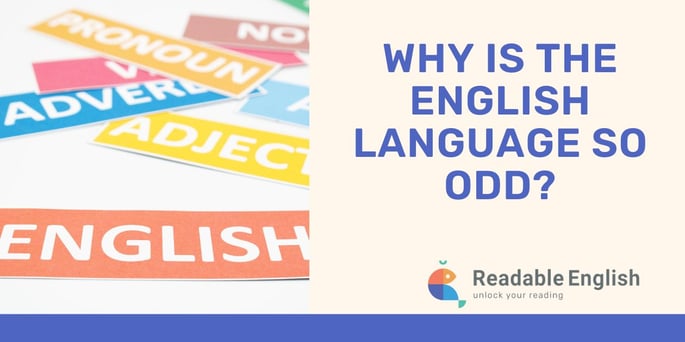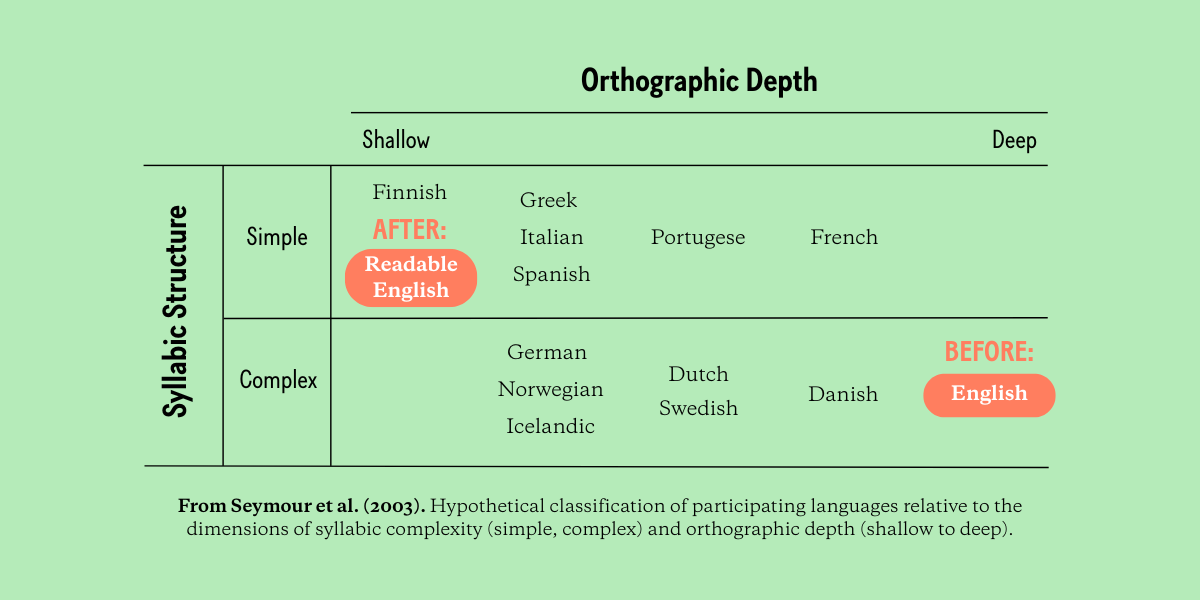Why English Is So Hard to Learn to Read - and How to Fix It
If you're a student learning to read French, Italian, or Finnish, odds are you're decoding words with ease within a year. But if you're learning to...
K-12Discover how Readable English is transforming reading instruction |
PROGRESS MONITORINGEasily assess and monitor growth with data-driven insights and reporting tools |
PROFESSIONAL SERVICESDiscover the services that support your success, from virtual training to expert coaching |
INDIVIDUALSStrengthen your reading skills with an interactive app tailored to your learning needs |
PARENTSEmpower your child's reading journey with an interactive app and expert strategies for home support |
|

|
Rethinking Reading: How One District Transformed Instruction (SmartBrief)Discover how a bold shift in reading instruction helped struggling learners thrive - and the critical role Readable English played in their success.
|
RESEARCH & RESULTSExplore peer-reviewed studies and real-world case studies on Readable English in action |
BLOGExplore articles on feature highlights, research deep-dives, and the latest literacy insights |
EBOOKDownload the ebook Why Learning to Read English is So Hard and how to Make it Easier |
CUSTOMER STORIESDiscover how educators and administrators are transforming literacy with Readable English |
RESOURCE AND PRODUCT ENABLEMENT LIBRARYFind essential educational references and instructional materials to enhance teaching |
FAQSFind essential educational references and instructional materials to enhance teaching |
NEWS & EVENTSStay up to date with media coverage, webinars, and upcoming events featuring Readable English |
|
|
Rethinking Reading: How One District Transformed Instruction (SmartBrief)Discover how a bold shift in reading instruction helped struggling learners thrive - and the critical role Readable English played in their success. |
The English language can be mastered… or can it? With the understanding of a few English idiosyncrasies, you soon learn that the language makes no sense at all.

Native English speakers seem to be able to pick up the oddities and mimic them well. But for non-English speakers trying to speak the language, it’s not long before they are scratching their heads in bewilderment.
When changing one letter changes the sound of a word, silent letters disrupt phonetics, homophones sound the same without being so, and odd phrases make literally no sense, confusion can prevail.

The English language borrows words from several different languages. Over time, English has changed and developed as it adopted these new words. This English mix, brought to Britain from German invaders, also includes traces of Latin, Greek, French, and Spanish.
There are so many oddities within the language that you just have to accept it the way it is. If you aren’t sure of the sounds or meaning of an English word, then it’s best to ask someone else or seek the dictionary.
Looking at these four letter words, you would expect that they would rhyme.
Using a B, T, and C completely changes a vowel's pronunciation. Although the words are spelled similarly, they sound nothing alike.
Additional examples of words that you would expect to rhyme based on spelling but do not include:
Home, some
Dose, lose, nose
HOMONYMS
At the same time, we seem to have words that are spelled the same yet have two completely different meanings.
Tear – to rip, pull apart with force as in “I will tear this up”
Tear – to cry, such as “He shed a tear”
Or
Pool – to bring together, e.g. “if we pool our resources we will achieve more”
Pool – a vessel in which you swim, e.g. “the kids are in the swimming pool”
Pool – the game of billiards, e.g. “let’s play a game of pool”
HOMOPHONES
Homophones are words that are pronounced exactly the same, yet spelled completely different. Just to confuse you even more, homophones all have different meanings.
ODDITIES
The literal interpretation of some sayings is not what they do at all.
We ‘ship’ by truck; our noses seem to ‘run’, while our feet tend to ‘smell’
We fill ‘in’ a form by filling it ‘out’; and our alarm goes ‘off’ by the sound turning ‘on’
SHHH, SILENCE PLEASE
Hundreds of silent letters add to the woes of the English pronunciation and spelling. These are those fascinating letters you never seem to hear, yet they always appear in the written form of a word. Unlike other phonetic languages, English often ignores the sounds of letters in a word. Here are some examples:
Doubt, debt, gnarl, gnome, knit, knob, knot, and knoll. It is a wonder we aren’t all wrecked, wrinkled, wriggling, and wrung out.
EL OR LE
Word endings may be pronounced the same yet spelled completely different. For example, words that end with the sound L are spelled with either ‘el’ or ‘le’.
Novel, level, cancel VS little, cable, or purple.
Isn’t it weird that the endings of travel, local, and example all sound the same yet have different spellings? 75% of words use the ‘le’ ending. So if you’re not sure which one to use, try this one and you’re most likely correct.
Learning to Read
So, when working with students who struggle with reading, show them these examples to remind them that English is one of the most difficult languages to learn to read. Understanding this important fact can empower them, and you, to have patience as they learn the English language.
Readable English unlocks this code hidden behind the rules, the exceptions, and rote memorization. We are the only reading intervention that gets students to grade-level reading using their own class curriculum, without having to be pulled out of class. Readable English quickly moves large-scale numbers of students to grade-level reading and beyond!

If you're a student learning to read French, Italian, or Finnish, odds are you're decoding words with ease within a year. But if you're learning to...

In today’s classrooms, educators are challenged to meet the needs of an increasingly diverse student population. Among the most complex needs are...

Learning English as a second language is a complex journey, with each learner bringing unique skills, cultural knowledge, and linguistic backgrounds...